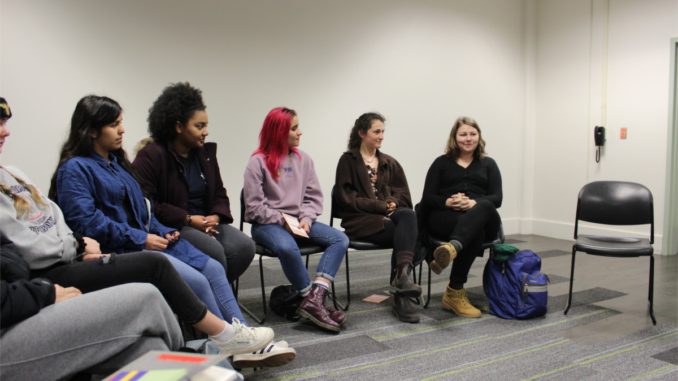
On the evening of Feb. 19 students gathered in Thayer to talk about colorism in a discussion group known as a Wokeshop. These sessions are sponsored by the office of Inclusion and Multicultural Engagement (IME) and each one has a different focus relevant to IME. This week’s topic was colorism, specifically as it comes up in social media, pop culture and the news.
Matthew Telles ’21 facilitated the discussion. He read a definition of colorism to make sure everyone was on the same page.
“Discrimination based on skin color, also known as colorism or shadeism, is a form of prejudice or discrimination in which people are treated differently based on the social meanings attached to skin color,” Telles said.
Telles works for IME as a Peer Education Coordinator, which means he holds office hours and Wokeshops for students to engage with issues of racial diversity and inclusion. He started by trying to facilitate a safe space for students.
“You don’t have to feel like we’re here to judge you,” Telles said. “This is a time to acknowledge problems and also speak on them.”
To illustrate the issue of colorism in pop culture, Telles showed a trailer of a Netflix original show that came out last winter, entitled “Made in Mexico.” While the actors were Mexican by nationality, they were all lighter-skinned Mexicans. Telles explained how this show presents only one segment of society, and darker-skinned people watching it won’t see anyone who looks like them. Colorism in this show thus perpetuates the harmful cultural narrative that lighter skin is more beautiful and desirable.
Students then were invited to speak about their own encounters with colorism, and shared memories of staying out of the sun to avoid getting darker and family members who used skin lightening products in order to change their appearance. One student mentioned that he got darker as he aged, and relatives made jokes about how he used to be so cute before. Another talked about how Mexican families encourage children to marry someone lighter in order to mejorar la raza (“improve the race”) when they had children.
These Wokeshops intentionally create a safe educational space for students to discuss sensitive issues, according to Telles.
“These are all about engagement and education,” Telles said. “We are just trying to build a community of people together and connect communities of people with each other, building bridges.”
Sheyla Dorantes Sanchez ’22, Ariely Mejia ’22 and Iyanah Fuller ’22 attended this colorism Wokeshop. They agreed that these events are a unique opportunity for serious discussion.
Fuller felt that the group made it easy to speak up compared to a formal academic setting.
“It’s just a drastically different environment than a classroom,” Fuller said. “It’s more intimate and I feel like I don’t have to police what I’m saying.”
For Dorantes Sanchez, this space is an opportunity to engage with topics students might not otherwise be educated on.
“Most of (the Wokeshops) are really interesting topics that you usually don’t have space to talk about anywhere else,” Dorantes Sanchez said. “Like colorism, maybe once in a while it will be addressed in class, depending on what classes you’re taking.”
Mejia said the workshop truly felt like an open discussion space where her voice could be heard.
“It’s a good place where you don’t have to be scared, and you can say what you think without anyone judging you,” she said.
Dorantes Sanchez said she appreciates the opportunity to discuss these issues with different people who could offer her different perspectives.
“It’s just a really good space to get these ideas out … and have that space to talk with people, most of which are actually genuinely interested in the topic and semi-educated about it,” Dorantes Sanchez said.
More Wokeshops are coming soon, which will be facilitated either by Telles or two of his co-workers.
“This semester we have five (Wokeshops),” Telles said. “The last one we had was acknowledging Portland’s racist history. My next one is in March and that’s going to be covering religious intersectionality specifically here at Lewis & Clark.”
IME’s Wokeshops are creating a space for students to discuss how issues of race affect them personally and how they see these issues play out in the world around them.
Subscribe to the Mossy Log Newsletter
Stay up to date with the goings-on at Lewis & Clark! Get the top stories or your favorite section delivered to your inbox whenever we release a new issue.

Leave a Reply